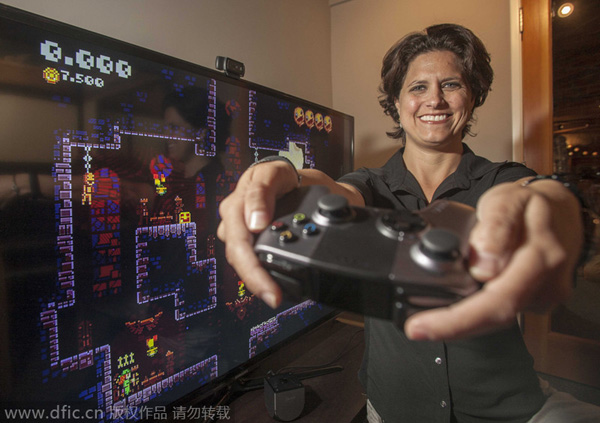 |
|
Julie Uhrman, CEO of Ouya,?shows a crowdfunded gaming console to?players on July 24, 2013, California, U.S. [Photo/IC] |
SAN FRANCISCO - US video game service Ouya is turning to Asia to capture the growth that has eluded the startup on its own home turf.
The Santa Monica, California-based firm has partnered with Xiaomi Inc to take its games to Chinese living rooms via the smartphone maker's new streaming boxes and "smart" TVs, an Ouya executive and a source at Xiaomi close to the deal told Reuters.
Xiaomi, which in three years became China's top smartphone seller ahead of Apple Inc and Samsung, harbors ambitions beyond mobile gadgets. Last year, it expanded into the TV and set-top box business with its "MiBox" and "MiTV."
Ouya Chief Executive Julie Uhrman said details are still getting hashed out but it's likely Ouya will get a dedicated channel on Xiaomi software installed on those devices, on which gamers can shop for and download a selection of its independently developed games later this year, Uhrman said.
Xiaomi will likely commit to marketing Ouya games, she said.
"For the likes of Xiaomi's MiTV, its set-top boxes and other Android set-top boxes that are entering the market, this could be a turning point..in bringing great content and developers to gamers and into a region that they have never had access to before," Uhrman told Reuters.
Ouya, which raised funds on crowdfunding site Kickstarter, began selling a $99 game console based on Google Inc's Android software last year. But sales were disappointing.
This year, Ouya started marketing its software as an app through which developers sell games on other hardware makers' devices. But the company, which has over 40,000 developers and more than 900 games on its platform, has sealed few partnerships, such as with Mad Catz Interactive Inc to stream games onto its M.O.J.O console.
Whether the Chinese take to gaming on TVs remains to be seen. But its deal with Xiaomi, which models itself on Apple, hands the startup a chance to distribute its content in a fast-growing video game market.
Unlike games on Apple and Google mobile devices, games developed for Ouya are designed to work on TV sets with controllers, similar to the Xbox and Playstation. Ouya and Xiaomi are discussing launch titles and marketing now, Uhrman added. The developers, Ouya and Xiaomi will share revenue, she said without elaborating.
China is the world's third biggest gaming market, where revenues grew by more than a third to nearly $14 billion last year. The government's move in January to allow Microsoft , Sony Corp and Nintendo Co to sell consoles has re-kindled interest in gaming hardware.
Chinese telecom equipment maker ZTE Corp for instance has tied up with game developer The9 to release the "Fun Box" console.
"The whole industry is still in a very early development stage," Uhrman said. "There is an opportunity for both" Xiaomi and Ouya.